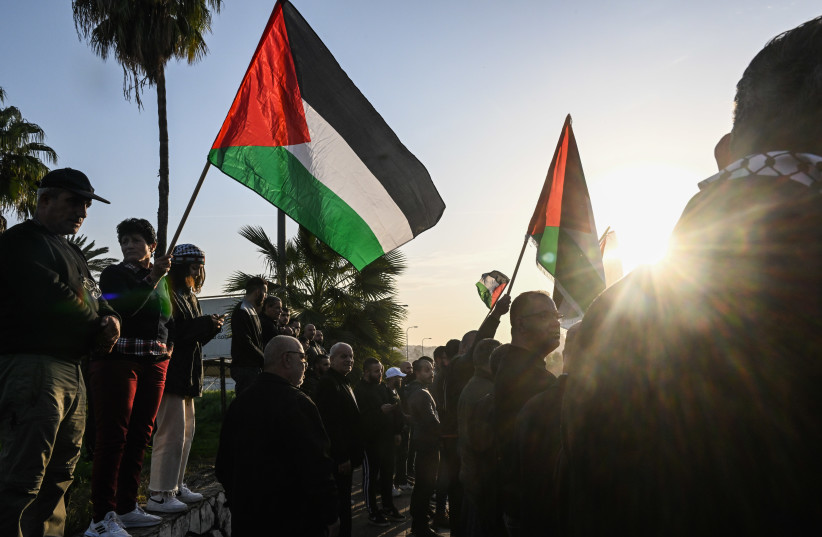A new survey of Arab Israelis found that a majority of Israel’s Arab citizens believe that Hamas intentionally attacked women and children on October 7, but that the community is split over who is to blame for those actions, whether those actions contributed to resolving the conflict, and whether the State of Israel’s response to those actions has been justified.
The poll was conducted by the Konrad Adenauer Program for Jewish-Arab Cooperation, a program of the Moshe Dayan Center for Middle Eastern and African Studies at Tel Aviv University. It included 502 Arab Israeli citizens aged 18 or over who constitute a representative sample of the adult Arab population. The margin of error was about 4.35% and it was carried about by the Stat-Net Research Institute under the direction of Yousef Makladeh.
Concerning the facts of what happened on October 7, a majority (56.8%) of Israeli Arabs overall believe that Hamas intentionally targeted women and children, while about a third (32%) don’t. The distribution of the population among these groups is not even: 86.7% of Druze respondents said they “strongly believe” that Hamas targeted women and children, and 88.9% of Christians believed it as well. Among Muslims, the numbers were lower, with less than 65% believing the accounts.
Concerning who is to blame for the events of October 7, only Druze respondents placed responsibility primarily on Hamas, with 76.2% pinning the blame on the Palestinian terrorist group. Christians blamed Hamas at a rate of 33.7%, and only 19.4% of Muslims did. Younger respondents were more likely to blame Hamas than older ones.
Did October 7 move us closer to a solution? The answers vary
Asked whether the attack of October 7 contributed to a resolution of the Israeli-Palestinian conflict, the general population was split, with a similar breakdown to the answers to previous questions. Druze respondents said that the actions of Hamas did not contribute to a solution to the Palestinian problem, at a rate of almost 80%. A significant majority (62.7%) of Christians said likewise, but only a slight minority of Muslims did (46%).
Bedouins in the Negev were more likely than other Arab Israelis to reject October 7 as having contributed to solving the conflict, with 59% of Negev Bedouins saying it was not constructive, whereas 49% of those in the North, only 47.6% of those in the Triangle region, and only 44.5% of those in mixed cities did.

When broken down by political party, those who voted for Balad, for Hadash-Ta’al, and those who did not vote were split on this question, with fewer than 50% saying that the attack did not contribute to a solution to the conflict. Respondents who voted for Jewish parties, however, said at a rate of 67% that they felt the attacks were not constructive, and Ra’am voters also took this view, at a rate of 58%.
The vast majority of Israeli Arabs support efforts by Arab citizens to help Jewish residents of Israel’s south who were affected by the attack, with 84.9% of respondents viewing these efforts favorably. More than half of respondents (54.2%) also look favorably upon Arab citizens’ support for Israel’s public relations efforts during the war. One-third of respondents view these initiatives unfavorably.
Impact of the war on Jewish-Arab relations
At the start of the war, many Israelis, Jewish and Arab, were afraid that relations within the country would degenerate into violence the way they did in May 2021. This has not happened, but 69.8% of Arab Israelis feel that solidarity between Jews and Arabs has weakened as a result of the attack on October 7. Only 11.9% believe that solidarity has strengthened, although this result is disproportionately represented among Bedouins in the Negev, many of whom experienced the attack alongside their Jewish neighbors.
A majority of respondents (58.9%) report that they fear being harassed by Jewish Israelis, but the vast majority (88.6%) say that they have not personally experienced such harassment firsthand, and 67.2% report that neither they nor their friends or relatives have experienced harassment. 11.4%, however, do say they have been harassed by Jewish citizens. Respondents aged 18-34 were almost twice as likely (20.2%) to report having been harassed than the general sample.
The survey also asked respondents what they believed to be the most realistic solution to the Israeli-Palestinian conflict. About half (52.2%) of respondents said that a two-state solution based on the 1967 borders was the most realistic. About a quarter (25.5%) said that they didn’t believe any negotiated solution was on the horizon. A small group (14.4%) said that a one-state solution for both Jews and Arabs was the most realistic solution.
These numbers represent significantly greater support for a two-state solution than has been seen in other recent surveys. In a November 2021 survey, only 23% of respondents chose that as the most realistic solution, and in May 2023, only 17.2% said they believed the conflict would be resolved with two states.
When asked to choose the most important component of their personal identity, almost a third of respondents (33.2%) mentioned their Israeli citizenship, similar to the proportion who mentioned their Arab identity. As was the case with other questions, though, this is not evenly distributed: 69.7% of Druze respondents named Israeli citizenship as a dominant part of their identity, whereas for residents of the Negev only 33.6% named it the most important component of their identity, and for residents of mixed cities, Arab identity was named as most important by almost half (49.1%), alongside Palestinian identity (22.8%.)
‘An unprecedented change’
The findings represent a major shift in the positions of Arab Israelis, said Dr. Arik Rudnitzky, who heads the Konrad Adenauer Program for Jewish-Arab Cooperation at Tel Aviv University, which conducted the study. “The war between Israel and Hamas,” Rudnitzky said, “has generated an unprecedented change in the positions of Israel’s Arab citizens.”
